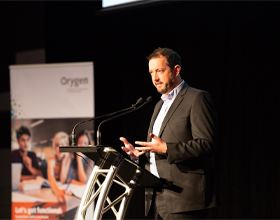
How we help young people who have had an experience of early psychosis reconnect with their employment and educational goals was the focus of a two-day symposium held in Melbourne last month.
The symposium, which was convened by Orygen’s National Programs team, attracted 250 people from around Australia.
The symposium, called Let’s Get Functional, brought together staff from primary care services and primary health networks, tertiary early psychosis workers, clinicians, academics, young people and family members.
Ms Heather Stavely, associate director of Orygen’s Australian Early Psychosis Program, said the symposium provided an opportunity to showcase the work of early psychosis services in Australia, share the latest research in functional recovery and consider the future of Australian early psychosis services.
Functional recovery means supporting young people with mental ill-health to regain their confidence and skills to fully engage in aspects of their lives that are important to them. This might include education, employment, physical health and stable accommodation.
“The symposium was a tremendous opportunity to not only spotlight the importance of functional recovery work in early psychosis, it also provided a platform for everyone to connect and share their invaluable knowledge, including the real-life experiences of young people and their families,” Ms Stavely said.
Functional recovery is an important element in helping a young person get back on track after experiencing an early episode of psychosis, Ms Stavely said. “The period between ages 12 and 25 is one of significant developmental change, when young people are establishing their identities, developing social roles and relationships, completing education and beginning to think about work prospects.”
Ms Stavely said the onset of early psychosis can affect a young person’s developmental trajectory and may have long-term, adverse effects on their functioning in these areas.
“There are many ways to work with young people and their families when we’re trying to improve functional outcomes.”
“Functional interventions not only support the young person in their day-to-day lives, but also allow them to approach the future with hope and optimism.” Ms Stavely said.
Presenters at the symposium included Professor Eoin Killackey, head of functional recovery at Orygen; Professor Jo Smith from the University of Worcester; Assistant Professor Nev Jones from the University of Florida; and Shannon McCleery-Hooper from Riverside County in California.